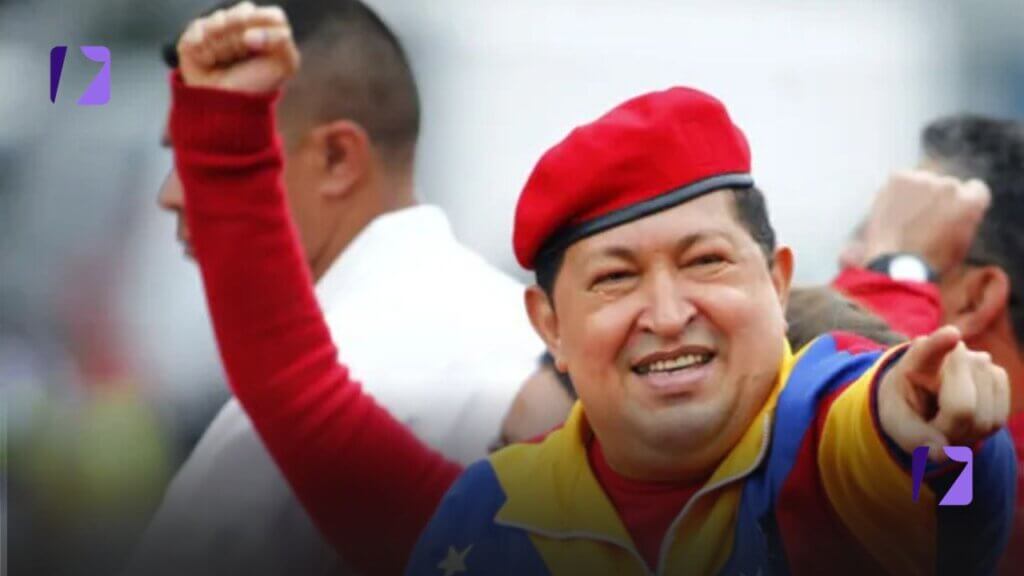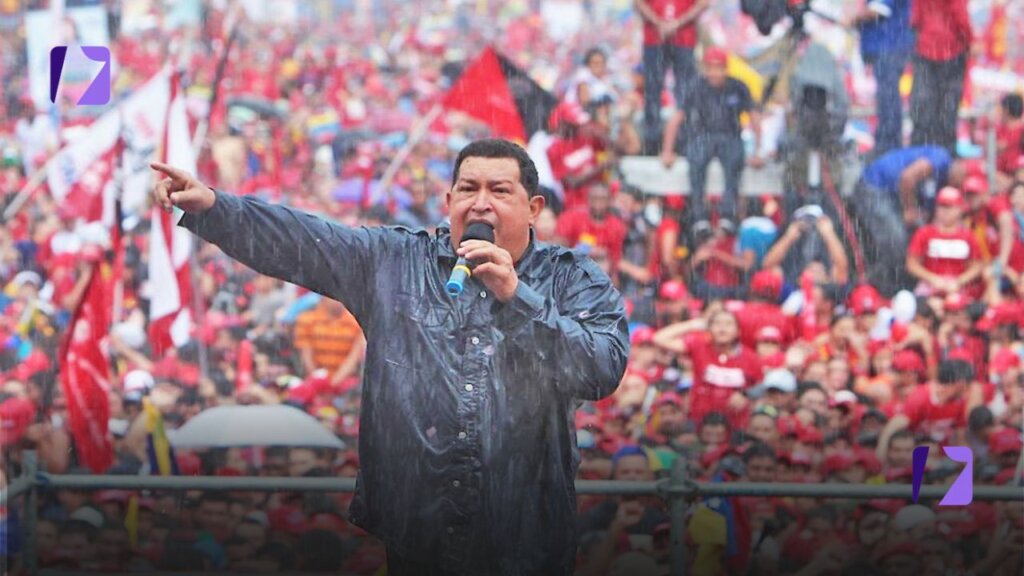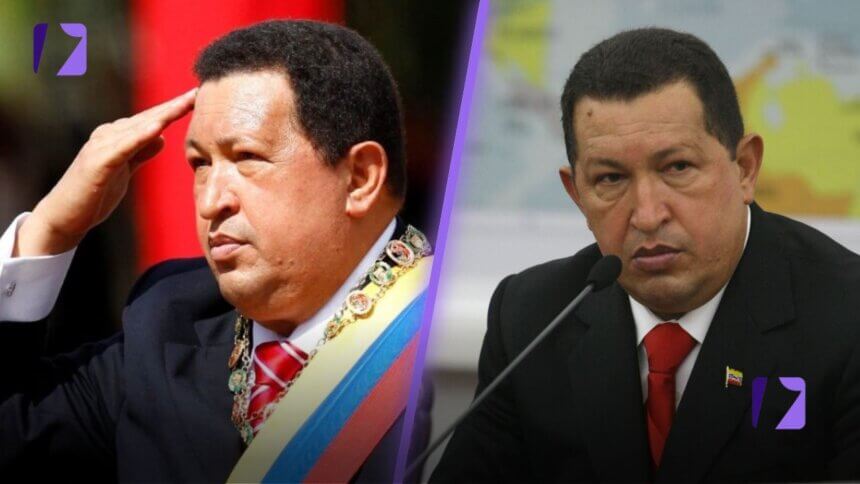Hugo Chávez was one of the most powerful and controversial leaders in Latin America. He served as President of Venezuela from 1999 until his death in 2013. Chávez promised to end poverty and reduce the influence of wealthy elites. Millions supported him because he invested in social programs and spoke loudly against the United States. However, rumors about his personal wealth grew over time. Many experts believe he controlled billions through the state oil company. His lifestyle appeared simple, but his financial influence told a different story. This article explores Hugo Chávez’s net worth, his wealth sources, and the legacy he left behind.
Quick Bio
| Key Detail | Information |
|---|---|
| Full Name | Hugo Rafael Chávez Frías |
| Date of Birth | July 28, 1954 |
| Birthplace | Sabaneta, Barinas, Venezuela |
| Presidency | 1999 – 2013 |
| Main Political Ideology | Socialism / Bolivarian Revolution |
| Major Wealth Source | Control of PDVSA (state oil company) |
| Estimated Net Worth | $1 Billion – $2 Billion (Disputed) |
| Date of Death | March 5, 2013, Caracas, Venezuela |
| Public Image | Anti-imperialist, pro-working class leader |
| Known Political Allies | Cuba, Russia, Iran |
| Known For | Anti-imperialism, welfare programs, political reforms |
| Legacy Debates | Economic collapse vs. social welfare achievements |
| Controversies | Corruption and hidden wealth allegations |
Early Life and Roots of Power
Hugo Chávez was born on July 28, 1954, into a humble family in Sabaneta, Venezuela. Growing up in a rural community, he witnessed poverty and social inequality firsthand experiences that deeply shaped his political mission later in life. His passion for national identity, inspired by Venezuelan hero Simón Bolívar, fueled his desire to create change. Chávez joined the military at a young age, viewing it as a path to education, purpose, and upward mobility. The armed forces not only provided him leadership skills but also introduced him to like-minded revolutionaries. Who shared his desire to challenge the existing system. These early influences laid the groundwork for his future political rise and the financial control he eventually wielded as Venezuela’s president.
- Quick Bio
- Early Life and Roots of Power
- Who Was Hugo Chávez?
- Hugo Chávez Net Worth (at the Time of His Death)
- Sources of Hugo Chávez’s Wealth
- Military Career and Political Awakening
- The Rise to the Presidency
- Financial Controversies and Corruption Claims
- What Happened to His Wealth After His Death?
- Impact of Hugo Chávez’s Economic Policies on Venezuela
- How Wealthy Was Hugo Chávez Compared to Other Leaders?
- Legacy: Wealth, Power, and Public Perception
- Conclusion
- FAQs
Who Was Hugo Chávez?
Hugo Chávez was a highly influential and controversial political figure who served as the President of Venezuela from 1999 until his death in 2013. He became widely known for his socialist ideology known as the Bolivarian Revolution. Which aimed to empower the working class, nationalize key industries, and reduce poverty through government-led social programs. Chávez positioned himself as a champion of the poor and a strong opponent of Western intervention, especially criticizing U.S. influence in Latin America. His supporters praised him for expanding healthcare, education, and social equality. However, critics argued that he centralized power, limited press freedom, and mismanaged Venezuela’s vast oil wealth. Under his leadership, Venezuela experienced both moments of economic growth and deep financial instability. Chávez’s legacy remains sharply divided some remember him as a defender of the people. While others blame him for policies that contributed to Venezuela’s modern economic crisis.
Hugo Chávez Net Worth (at the Time of His Death)
The exact value of Hugo Chávez’s wealth remains one of the most debated topics in Venezuela’s modern history. Officially, he earned a modest presidential salary and portrayed himself as a leader who lived simply, dedicated to the working class. However, numerous international investigations, leaked banking documents, and expert financial analyses tell a very different story.
Reports suggest that Chávez’s real financial power came from his control over Venezuela’s oil-rich economy, particularly the state-owned company PDVSA. Through this system, he had the ability to redirect national funds, approve secret financial dealings. And influence high-level contracts creating conditions where personal enrichment was highly possible.
Because transparency inside the government sharply declined during his rule, exact numbers are difficult to verify. Yet many analysts estimate that Hugo Chávez’s net worth at his peak ranged from $1 billion to $2 billion, with much of it possibly hidden in offshore accounts or managed by trusted allies. This huge gap between his public image and reported wealth continues to spark controversy, even years after his death.
Sources of Hugo Chávez’s Wealth

Understanding Hugo Chávez’s wealth requires looking far beyond his official income. Publicly, his salary as president was modest, reinforcing his image as a humble socialist devoted to ordinary citizens. However, the real foundation of his financial power came from his direct control over PDVSA, Venezuela’s state-owned oil company. With the nation holding some of the world’s largest oil reserves, the billions generated through PDVSA became deeply intertwined with the presidency. These funds were used to support national welfare programs. But also played a major role in strengthening political loyalty, financing military leadership, and maintaining alliances with partner countries.
In addition to state resources, analysts believe that Chávez benefited from business networks formed through trusted associates. Investments linked to his inner circle reportedly included foreign properties, private enterprises. And lucrative contracts many of which lack clear documentation. International banking leaks and investigative reports have also pointed to potential offshore accounts, suggesting that a portion of Venezuela’s oil revenue may have been secretly transferred abroad. While direct proof remains limited due to restricted transparency during his rule, the combination of political authority, state wealth, and concealed financial channels indicates that Chávez’s access to money was far greater than publicly acknowledged..
Military Career and Political Awakening
Hugo Chávez’s journey to power began through the Venezuelan military, which became the training ground for his leadership and political beliefs. During his service as an officer, he immersed himself in socialist and revolutionary ideas inspired by Simón Bolívar. These ideologies shaped his vision of transforming Venezuela into a nation that challenged social inequality and foreign influence. The military also connected him with fellow officers who shared his beliefs, forming a secret political movement within the ranks. With access to national institutions, strategic knowledge, and growing influence among the armed forces, Chávez positioned himself as a future leader capable of reshaping Venezuela. His time in the military did not just build discipline it gave him the network, ideology, and platform needed to pursue political power.
The Rise to the Presidency

Chávez first captured national attention in 1992 when he led a coup attempt against the government. Although the coup failed, his defiant stance and televised message earned him admiration from citizens tired of corruption and inequality. After being pardoned, he shifted his focus from uprising to democracy, recognizing that voter support could achieve what force could not. Capitalizing on widespread public frustration, Chávez campaigned on promises of justice, wealth redistribution, and a new political order. In 1999, he won the presidency with strong popular backing, beginning a new era known as the Bolivarian Revolution. Once in office, he restructured Venezuela’s economy, strengthened state control over key industries bespecially oil and used these resources to expand his political power domestically and internationally.
Financial Controversies and Corruption Claims
Hugo Chávez’s presidency became increasingly linked to financial secrecy and corruption allegations, especially as his control over Venezuela’s oil wealth tightened. Transparency advocates noted that public financial audits were significantly reduced, making it difficult to track how billions of dollars in national revenue were spent. During this period, members of Chávez’s inner circle military leaders, loyal politicians, and connected business figures gained access to major state contracts and oil profits. International watchdog organizations documented a rapid rise in corruption complaints, suspicious offshore accounts, and unexplained losses in public funds. Critics claim this environment allowed wealth to move quietly into private hands while the government promoted an anti-elitist message. Although supporters argued that many accusations were politically motivated, the lack of financial accountability continues to spark debate about the true scale of assets controlled by Chávez and his allies.
What Happened to His Wealth After His Death?
When Hugo Chávez passed away in 2013, his personal wealth and financial influence did not simply disappear much of it became absorbed into the political system he left behind. Because he kept few assets publicly recorded in his own name. There has never been a clear accounting of what belonged to him personally versus what was controlled through the state. After his death, key economic authority shifted to Nicolás Maduro and the elite loyalists who maintained control of PDVSA. Military industries, and state-funded business networks. Reports suggest that certain assets and financial channels stayed within Chávez’s inner circle, while family members maintained influence over undisclosed properties and overseas accounts. The opacity surrounding his finances means the exact distribution of wealth remains unknown. However, analysts agree on one thing: the economic structure Chávez built centralized, politically controlled. And lacking transparency continues to shape how power and wealth operate in Venezuela today.
Impact of Hugo Chávez’s Economic Policies on Venezuela
Chávez invested heavily in welfare programs like free healthcare and education. Poverty dropped during high oil prices. However, the economy relied almost entirely on oil. When prices crashed:
- Inflation increased massively
- Local industries collapsed
- Food and medicine shortages grew
Supporters praise his reforms. Critics blame him for long-term economic damage.
How Wealthy Was Hugo Chávez Compared to Other Leaders?
Although Hugo Chávez consistently rejected claims of personal wealth and promoted. The image of a humble socialist warrior, multiple financial investigations paint a very different picture. Analysts often place him among the richest political leaders of his time not because of private entrepreneurship. But because of his unparalleled control over Venezuela’s vast oil revenues. Unlike elected leaders who oversee state assets with checks and balances, Chávez operated within a system where financial oversight weakened each year of his rule.
This allowed him and a close circle of allies to manage billions in public wealth with very limited transparency. While exact figures remain disputed, the scale of resources under his influence surpassed. That of many world presidents and even approached the financial leverage exercised by monarchs in oil-rich nations. His fortune real or accessible became tightly interwoven with state power, making it one of the most controversial and difficult-to-measure political fortunes in modern history.
Legacy: Wealth, Power, and Public Perception
Hugo Chávez’s legacy continues to divide opinions across the world. To millions of his supporters, he is remembered as a fearless leader who confronted inequality, challenged powerful global institutions, and redirected national resources toward the working class. They credit him for expanded social programs, improved literacy, and stronger national identity rooted in Bolivarian ideals. However, critics argue that behind his revolutionary message was a system built on unchecked authority, financial secrecy, and political favoritism. They believe his control over the country’s wealth contributed to economic instability and set the stage for Venezuela’s later crisis. This contrast celebrated champion of the poor vs. accused architect of corruption. Defines the ongoing debate about his true impact. His net worth serves as a powerful symbol of the complicated relationship between socialist leadership and personal power, ensuring that his influence on history remains both significant and deeply controversial.
Conclusion
Hugo Chávez’s net worth represents far more than personal finances it symbolizes the complex duality of his leadership. He rose to power pledging equality, dignity, and justice for the poor, reshaping Venezuela with bold socialist reforms. Yet, ongoing allegations of hidden fortunes and financial secrecy reveal another side of his influence one closely tied to state-controlled wealth and political loyalty. His decisions left a permanent mark on Venezuela’s economy, strengthening social welfare for many while also contributing to long-term economic instability. Today, the debate continues: was Chávez a revolutionary icon who empowered the masses, or a leader who concentrated power and wealth behind the scenes? His financial legacy remains a powerful reflection of those contradictions admired by supporters, condemned by critics, and still deeply discussed around the world.
FAQs
What was Hugo Chávez’s estimated net worth?
Most estimates suggest between $1–2 billion, but exact figures remain unverified due to lack of transparency.
Did he personally control Venezuela’s oil money?
He had major influence over PDVSA, giving him access to national revenue, although not direct legal ownership.
Was any of his wealth hidden offshore?
Several investigations suggest hidden accounts existed, but supporters claim the reports are politically motivated.
How did his economic decisions affect Venezuela?
Social programs improved lives early on, but later the economy collapsed due to oil dependency and poor management.
Did he live a lavish lifestyle?
Publicly he appeared simple, but his political inner circle reportedly enjoyed luxury and high security.
Visit More: Apex Magazine









